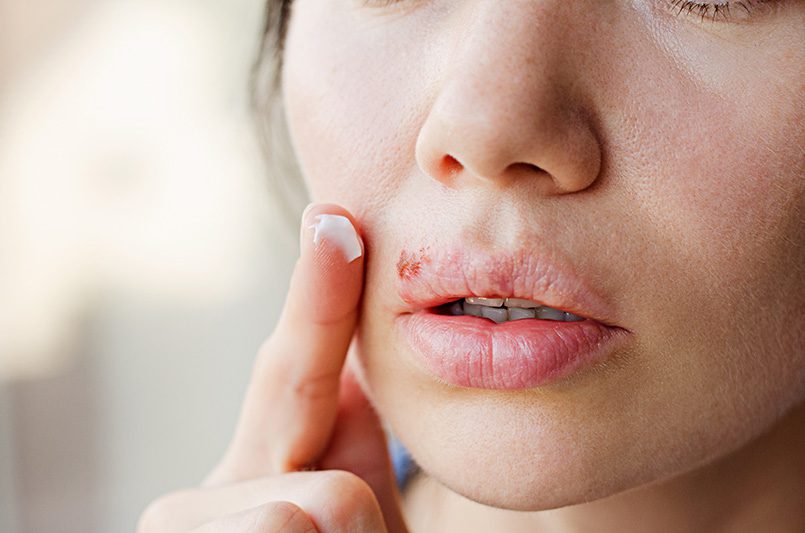By Brianna Kops
2023 UBC PharmD Candidate
Cold sores — also called herpes labialis — are painful lesions around the mouth that are caused by the Herpes Simplex Virus 1 (HSV-1). Cold sores can be transmitted from person to person via contact with the infected sore or saliva, usually from mouth-to-mouth contact. However, someone with a cold sore can also transmit the virus through sharing cosmetics, razors, towels or eating utensils with others. (1)
When someone becomes infected with HSV-1 for the first time, it can feel like a flu, with symptoms like sore throat, fever, chills, or muscle aches. After the first infection, HSV-1 remains inactive in our body, but can be re-activated and cause repeat infections or “flare-ups.” These flare-ups manifest mainly as cold sores around the mouth. Interestingly, around 80% of adolescents and adults have already been infected with HSV-1 and therefore have the inactive virus in their body. (1)
Not everyone who has HSV-1 will experience recurrent cold sores. For those that do, there are certain triggers that can cause flare-ups, although they will differ for everyone. Some common triggers include:
- Excessive sunlight
- Stress
- Lack of sleep
- Menstruation or hormonal changes
- Respiratory infections (cold, flu)
- Fever
- Certain surgical procedures or dental extractions
Reducing stress by eating well, exercising often, sleeping well, and practicing mindfulness or meditation can help reduce the incidence of cold sores in those who find that stress is a trigger. Applying sunscreen with an SPF of 30 or greater to the area can also help. Those undergoing surgical procedures, especially those around the face, should inform their surgeon that they have recurrent cold sores, as preventative medication may be given ahead of time. (1,2)
When cold sore flare-ups are about to happen, people often feel a tingling, itching or burning sensation around the mouth. This usually happens about 2 to 24 hours before the appearance of the cold sore. The cold sore will then begin to form as a red lesion with little bumps that eventually erupt and leak a clear, sticky fluid. The sore will then crust over and heal within 3-10 days.(1)
Managing cold sores
It’s important to avoid touching a cold sore as much as possible, and to use frequent hand washing to prevent spreading the virus to others. To keep the area around a cold sore clean, it’s recommended to wash with mild soap and water, or to soak the sore with a cool tap-water compress.(1)
Cold sores can be painful, itchy, and bothersome. There are a few over-the-counter options to help:
- Oral pain medications: acetaminophen (Tylenol), ibuprofen (Advil), and naproxen (Aleve)
- Topical anesthetic creams or ointments applied over the cold sore: benzocaine (Orajel), camphor & menthol (Blistex)
Abreva is an over-the-counter antiviral cream that can provide some benefit. It is most effective when started within 12 hours of the first tingling, itching, redness, or burning symptoms that precede a cold sore forming. It should be applied five times a day to the cold sore area until it is healed. When used this way, it can modestly decrease the time it takes for a cold sore to heal. (1)
Lysine is an amino acid that is found in the food we eat, but it can also be taken as a supplement or used in a cream. Taking a 1000 mg oral supplement of lysine one to three times a day may reduce the frequency and severity of cold sores. (3) However, the safety of taking lysine at these doses for over a year has not been established.
If cold sores are moderate to severe or happen frequently throughout the year, a prescription for oral antiviral medication may be provided. (2) If you think you are experiencing a cold sore, it’s best to visit your primary care provider to get a diagnosis.
References
- Woo SA. Cold Sores (Herpes Labialis) [Internet] In: CPS. Canadian Pharmacists Association [revised 2022 Nov 24; cited 2023 Mar 06]. Available from: myrxtx.ca
- Wald A, Johnston C. Treatment and prevention of herpes simplex virus type 1 in immunocompetent adolescents and adults [Internet] in UpToDate. Wolters Kluwer [revised 2022 Jun 8; cited 2023 Mar 06]. Available from: uptodate.com
- Lysine professional monograph [Internet] in: TRC natural medicines. Therapeutic research centre; 2023. Lysine; [revised 2021 Nov 30; cited 2023 Mar 06]. Available from: naturalmedicines-therapeuticresearch-com
